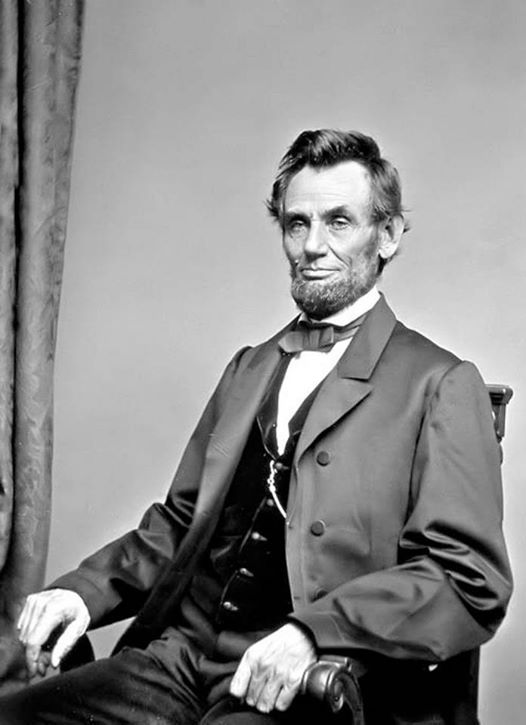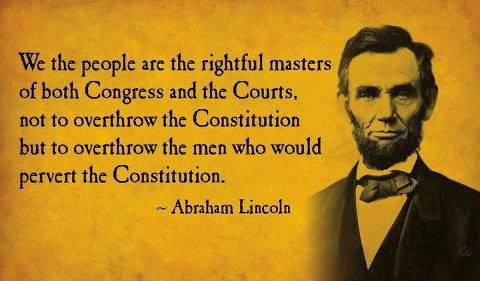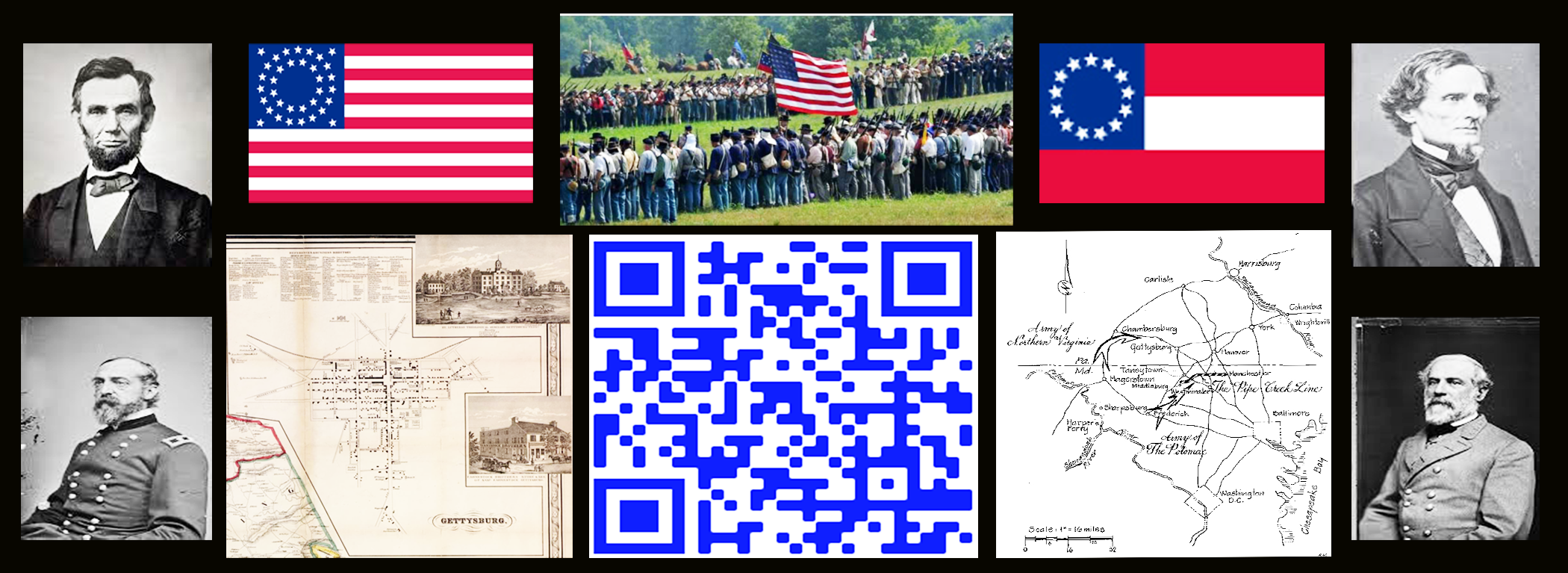Part 1 = NIMBY
Abe Lincoln was born in northern Kentucky in 1809. About seven years later, his father moved the family to southern Indiana to procure farmland with a more secure title and then over to Illinois where Abe spent most of his adult life.
Many of the residents of both southern Indiana and Illinois, moved there to escape having to deal with or confront slavery in Kentucky. Both Illinois and Indiana were slave-free states, but they were far from black-friendly. Indeed, the Constitutions under which they were admitted to the Union prohibited slavery, but there were laws on the books that were meant to discourage free-blacks from settling there. Blacks were required to ‘post a bond’ of $1000 (a fortune in those days); they were prohibited from certain professions and of course, they had no voting rights, but they could hold title to land. One man (who would later be elected governor of Illinois) brought his slaves there, secured title to a large tract of lane and freed those slaves giving each of them 160 acres to farm. These States did, however, permit indentured servants so many blacks lived there under that status; not being called a slave didn’t make them ‘free’.
Lincoln rarely spoke of his early life so what is known about it is mainly inferred from the common experiences of the era. Because of the anti-black laws, there were only a few dozen blacks registered in the early 1800s censuses in Illinois. It is highly unlikely that Abe would have had any but the most fleeting contact with slavery until he was a young adult. Although the details are largely unknown, Lincoln did make several trips down the Mississippi on flatboats to carry farm goods to market. He is known to have visited most of the large cities along the river and spent a few months in New Orleans. All of these places had active slave markets and he would likely have encountered slaves working the wharves.
For most of Lincoln’s life, slavery was something to be read about in the newspaper rather than experienced. He was a contemporary of Henry Clay, who although he lived in and represented the slave-state of Kentucky was personally opposed to the concept. Lincoln once proclaimed that “I can express all my views on the slavery question by quotes from Henry Clay“.
It wasn’t until he became President that he was confronted personally with the moral and economic dilemma of slavery. While against the concept of slavery, he certainly was not an advocate for black equality. Lincoln had publicly stated that he believed blacks to be intellectually and morally inferior to whites and that they would not likely successfully integrate into western society.
While some of the Northern States had abolished slavery and new States were writing constitutions that prohibited it, many Northern States tolerated it. Most slaves held north of the Mason-Dixon Line were household servants not field hands or factory workers. It was not uncommon in the early 1800s for a slave owner to place a provision in his will to free his slaves. But those provisions generally stopped there; no ‘coin’ was provided to assist those slaves to “pursue happiness” in their new status.
For Northerners, the most common attitude towards slavery was “not in my back yard” (NIMBY). There were two major lines of thought concerning what should become of blacks after their emancipation. One group of secular realists was in favor of abolishing slavery but wanted to have nothing to do with those freed slaves. They were known as Colonizationists. They favored “exporting” all blacks out of the country. They were quite racist in their views that blacks were unfit for integration into white (European) society. They didn’t care where the blacks went as long as they didn’t live nearby = NIMBY.
The second group were the “Abolitionists”. They tended to come from a more religious background and were more tolerant of the full integration of blacks into society. They held more firmly to the concept stated by Jefferson that “all men are created equal”. Although many would have been quite happy if the blacks just stayed in the South! During his term as POTUS, Lincoln seemed to drift into the Abolitionist’s camp.
There is one oft-overlooked element of the Colonization movement: Congress had outlawed the import of new slaves into the USA in 1808 (one year before Lincoln was born). Many had hoped that slavery would die out of its own accord. But the population of slaves already present was sufficient to perpetuate the process. The 1860 census registered a total of about 4 million slaves in the USA. Most of them were not ‘unwilling immigrants’ but had been ‘born in the USA’. The irony of the white Northerner’s suggestion that they should ‘go back’ to Africa is that by the 1860s very few living slaves had originated there. Besides, no one asked the blacks what their preference was. History records that the country of Liberia was indeed established in West Africa under a constitution that is almost a twin of America’s but relatively few blacks ‘repatriated’ themselves to Africa. [see https://en.wikipedia.org/wiki/Liberia ]
Although he held firmly to the belief that the entire Civil War was more over State’s Rights than slavery, Lincoln eventually came to the position that slavery had to be abolished and if Congress wouldn’t do it, he would. He waited until after the major Union victory at Gettysburg to sign the Emancipation Proclamation (EP). Many historians argue that he really had no such power to do so. Even so, the EP was not as far-reaching as most people believe, even today. The EP actually only freed the slaves only in areas controlled by the Union Army in the Confederacy.
The EP created a crisis of sorts as one of it unintended consequences. At this time in the war, the Union Army controlled large areas in the Confederacy. The now-freed slaves in those areas became displaced persons with no place to go and no place to go back to. Many of these found their way to Union camps and essentially demanded ‘asylum’. They came to be a huge logistical burden to the Union Army. This perhaps even prolonged the war since soldiers and supplies had to be diverted from combat operations to protect and feed these ‘refugees’.
The majority of slaves, those in the “Deep South”, were not freed by the Emancipation Proclamation until after the Confederacy capitulated in 1865. Lincoln’s dream of a re-born, re-united country offering “life, liberty and the pursuit of happiness” to all died in April 1865 upon his assassination.
Part 2: Post-war NIMBY
Since the Confederacy had a very small navy, one of the Union Navy’s critical functions throughout the Civil War was to enforce a blockade of Atlantic and Gulf coasts of the Confederacy. This gave rise to a new entrepreneurial concept of blockade runners. These privately-owned, small, fast ships were designed to out-sail and out-maneuver the larger, slower Union warships.
European countries, particularly England, France and Spain as well as the Netherlands, had a lucrative trade with the USA through the early 1800s. With the advent of the Civil War and the institution of a blockade of the Confederacy, profits fell off immensely. Something had to be done. To their benefit, all of these countries still maintained colonies near the USA; mainly in the Caribbean. Their large merchant ships could still sail there freely, even if they couldn’t get to the southern US ports now belonging to the Confederacy.
Blockade runners filled the gap. These small fast ships would shuttle between the Confederate ports and the nearby European colonies. Because the journey was quite short, they could make frequent trips to deliver cotton – the product most often in demand – and return with war materials or simple trade goods. This newly created link would sustain the Confederate war effort long past its point of demise if it had had to rely on goods and war materials made in the South.
ALTERNATE HISTORY: Once the war ended the need for these small fast ships was gone; they faded into history. But I’d like to suggest that had they wanted to they could simply have begun to operate a ‘reverse slave trade’.
In the mid-1860s, the newly re-united country was not necessarily a black-friendly place. It was clear that the newly-freed blacks – although most had been born in the USA – were not anytime soon going to be welcomed into the bosom of the country. Since the vast majority of former slaves had no link what so ever to Africa, the concept espoused by the Colonizationists needed a bit of tweaking.
As a result of their former status as slave-holding colonies, most of the European colonies in the Americas had large black populations. In point of fact, most slaves ‘exported’ from Africa went first to the Caribbean rather than the USA. In many places, blacks were even the majority as compared to the white residents – who by now were also largely native-born rather than migrant colonists. It would seem to me that the US-born blacks would have been more readily assimilated into those societies – regardless of the language they spoke.
Couple this with a large fleet of ships for which there was no longer a need and one would think that a ‘ferry’ service for blacks to emigrate out of the USA would have been a lucrative business opportunity. Anyone who sought to continue on to Africa could likely have done so with relative ease. There would seem to have been ample space and opportunity for these US-born blacks to have found a new ‘home’ in the Caribbean.
I have no idea what the European monarchs would have thought of this concept, but if it had been established, it seems that they would have been at a loss to stop the migration. In addition to the two largest islands of Cuba and Hispaniola, there were numerous largely-uninhabited islands throughout the Caribbean. These newly-freed blacks would not even have had to be integrated into the existing European colonies like Havana or Jamaica. They could have essentially appropriated their own land and founded their own US-linked ‘colonies’.
Given the NIMBY attitude of much of the US population of the USA in the mid-1860s, it is highly likely that the US government and private organizations would have been willing to subsidize such a migration. Even if a substantial majority of the 4 million slaves had chosen such a path, the overall population and economy of the post-war USA would not likely have been much affected.
It begs the question as to whether a ‘forced emigration’ would have worked. A voluntary (if subsidized) emigration would have been more morally acceptable to most white Americans. Just think of the effects that such a migration might have had on the future political situation in the Deep South. One of the greatest fears throughout the South was the potential economic and political power of freed-blacks who in many areas out-numbered the white residents. This deep-seated fear was the genesis of many of the anti-black ‘Jim Crow’ laws and the reason why blacks were segregated well into the next century (nearly 100 years after their ‘emancipation’). Had they not been there, had they chosen to emigrate, many of the atrocities perpetrated against blacks would possibly have been avoided. Had a substantial portion of the 4 million slaves departed the USA, it is likely that the remainder would have been more smoothly integrated into US society.
Even if these newly-established US-colonies in the Caribbean had been heavily subsidized by the US taxpayers, the overall toll of suffering, death and economic hardship would seemingly have been greatly reduced. The political and moral chaos in the Deep South known as the “Reconstruction Era” could also have been largely avoided. There would have been no reason for organizations like the Klu Klux Klan!
Would not all parties involved have been better off if a majority of newly-freed blacks had been given the opportunity to start a new life in a new place? Could the USA have avoided more than 150 years of strife and racial division that continues into the present day?
In short, would a ‘whiter’ America have been a better America?


Part 3 The Speech
I don’t even know if they teach this any more. If you are not familiar with the story, I suggest you GOOGLE it!
Four score and seven years ago our fathers brought forth on this continent, a new nation, conceived in Liberty, and dedicated to the proposition that all men are created equal.
Now we are engaged in a great civil war, testing whether that nation, or any nation so conceived and so dedicated, can long endure. We are met on a great battle-field of that war. We have come to dedicate a portion of that field, as a final resting place for those who here gave their lives that that nation might live. It is altogether fitting and proper that we should do this.
But, in a larger sense, we can not dedicate — we can not consecrate — we can not hallow — this ground. The brave men, living and dead, who struggled here, have consecrated it, far above our poor power to add or detract. The world will little note, nor long remember what we say here, but it can never forget what they did here. It is for us the living, rather, to be dedicated here to the unfinished work which they who fought here have thus far so nobly advanced. It is rather for us to be here dedicated to the great task remaining before us — that from these honored dead we take increased devotion to that cause for which they gave the last full measure of devotion — that we here highly resolve that these dead shall not have died in vain — that this nation, under God, shall have a new birth of freedom — and that government of the people, by the people, for the people, shall not perish from the earth.
Abraham Lincoln
November 19, 1863
